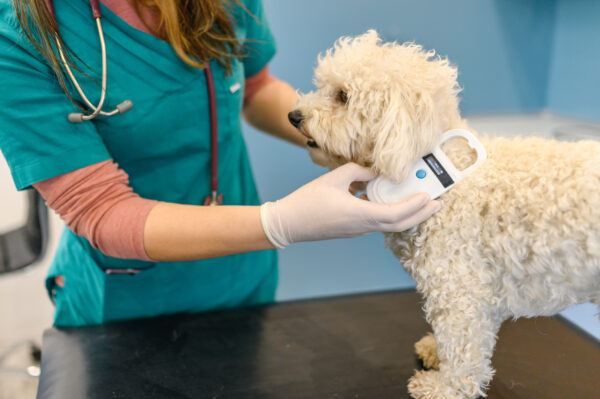Many people choose spring to welcome a new puppy or kitten to the family, so whether your new arrival is imminent or you’re considering a pet in the near future, we’ll fill you in on all the essential prep and handy pointers before you pick them up.
Before they arrive
April to September is a popular time for people to bring home their furry arrival, whether you know a neighbour with a pet who has recently given birth, or have sought out a reputable breeder. We’re of the opinion that any animal will bring joy into your life, but the satisfaction of rescuing a pet in need through adoption will make the experience even more fulfilling. We would always encourage visiting a rescue centre if it’s an option, and giving a cat or dog a second chance at a happy, healthy life.
As soon as you’ve chosen your new pet, or more likely, as soon as they’ve chosen you, the first thing you’ll want to do is ensure they’ve spent eight weeks in the company of their mother and siblings. This time of bonding and nurture is essential for their development.
While you wait for their arrival, one of the best things you can do is pet-proof your home. Cover all bases, from hiding exposed electrical cords they might try to chew on, add safety locks to doors or areas that might be a safety hazard, and consider rehoming or moving plants that might be toxic to pets.
Assign responsibilities
It’s wise to be aware from the beginning that owning and caring for a pet is a big responsibility and a serious commitment. Giving everyone in the family an assigned role will help your new puppy or kitten feel at home and adapt to their new surroundings. Choose who will walk the dog, who will feed the kitten and who will be in charge of grooming. A consistent routine will benefit both you and your new furry family member.
Pet essentials we recommend
- A crate or carrier to take them to the vet
- Specialist food for puppies or kittens
- Bowls for food and water
- A comfortable bed for cats or dogs
- Toys
- A collar and ID tag
- A lead or harness (for dogs)
- A tray and litter (for cats)
- A scratching post (for cats)
Some new owners find that pheromones and calming products are helpful when welcoming a new puppy or kitten. Adaptil (for dogs) or Feliway (for cats) can help replicate the smell of your pet’s mother, creating a sense of reassurance and reducing stress when settling into a new home. We recommend their plug-in diffuser for dogs or cats in the home, starting to use it roughly two weeks before they move in. Spraying their carrier and your car with the Adaptil or Feliway spray can also help make the journey home easier. Spritz around 15 minutes beforehand.
★ New pet tip
When you’re first introduced to your new pet, leave a piece of clothing that belongs to you, such as a t-shirt or small blanket, which they can use as part of their bedding. Cats and dogs rely heavily on their sense of smell, so this will help them get used to your scent, in turn helping them feel more at ease when you collect them and bring them into your home.
They’re home!
When the day finally arrives, remember that your new pet might feel a little unsettled after their journey. For kittens, choose a quiet space, preferably an entire room, where they can stay for a few days before exploring the rest of the house.
We know this next bit of advice may be frustrating, but resisting from cuddling and petting your new kitten or puppy at first is the best approach. Letting them make the first move and approach you will reduce anxiety and make them more comfortable. When they’re more familiar with their new environment, they’ll be set to meet other people, including any other pets in the household.
★ New pet tip
Playing with your pet is a great way to break the ice. It’s a fun approach to bonding and will feel less intrusive and overwhelming for them.
A few days in
After the initial move, your new pet should start to feel more comfortable within a few days. They’ll hopefully come out of their shell, be keen to play and start responding when you call their name. Don’t fret if this isn’t the case for your pet, some furries may be shyer and need more time.
It’s wise to keep a close eye on your new pet’s eating and toilet habits to become familiar with what’s normal for them. They should be eating regularly and their poo should be clean, meaning it should be free of blood and parasites.
This may seem obvious, but remember you’ll need to have plenty of patience with your new puppy or kitten. They will likely want to chew, explore, scratch and generally get in the way, but this is simply their natural instinct. As they grow and learn the rules, they will use their scratching post, their litter tray and choose their toys as a plaything (instead of your shoes).
Don’t be concerned or disheartened if your existing pets act with some hostility towards your new pet. It can take weeks for pets to befriend one another, or even simply tolerate them. Ensuring they have separate beds, litter trays and bowls will prevent further issues and put a stop to any feelings of jealousy or competition.
A few days after they’ve settled, take your pet to the vet. That way they can get a general health check, with your vet looking for parasites or anything unusual. This is also the best time to discuss vaccinations, neutering, insurance and microchipping. It can sound overwhelming, but each of these things will keep your pet happy, safe and healthy for the future.
★ New pet tip
If you plan on letting your cat outside, make sure they’ve totally adjusted to their new home before they’re allowed out. This can take weeks. As a general rule, pets shouldn’t be let outdoors until they’ve had their vaccinations, and for cats, after they’ve been spayed or neutered. Safety first!



